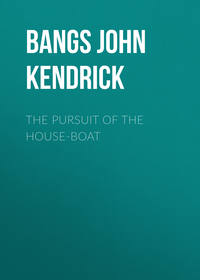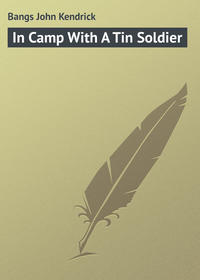 полная версия
полная версияBikey the Skicycle and Other Tales of Jimmieboy
"Really?" asked Bikey. "Queer law that, isn't it?"
"I don't see why you think that," replied the landlord. "Is it a queer law which results in the saving of people's lives?"
"No; but the way to save people's lives would be to remove that stone wall," said Bikey. "And that's the thing that makes this place dangerous."
"I don't like to be impolite to biklemen," said the landlord, "but I must say that you don't know what you are talking about. Do you suppose I am in business for fun?"
"I don't see what that has to do with it," said Bikey, ruefully regarding his tires, which looked for all the world like porous plasters would look if they were sold by the yard.
"Well, I'll show you in ten seconds," said the landlord. "Do you see this inn? I presume you do, though there seems to be so little that you see that I have my doubts. Well, this inn is run, not because I think it's a game I'm playing, but because I'm after money. Now, this inn wouldn't earn a cent of money if biklemen didn't stop here. See that?"
"Yes," said Bikey. "That's plain enough, but that doesn't account for the tacks or the stone wall."
"Yes, it does, too," retorted the landlord. "I ran this inn two years before that stone wall was built, and I paid the government $500 a week for being allowed to do it, but nobody ever stopped. Every bikleman in the universe went coasting by here and never a one stopped in, so I never got a cent and was paying $26,000 a year to the government into the bargain. Of course I complained to the Secretary of the Interior, and he just laughed me off; said it wasn't his fault; that I ought to do something myself to make 'em stop, and that is how I came to build the stone wall. They've got to stop now. See that?"
"Yes," said Bikey, "I see. And did you begin to make money?"
"Well, rather," said the landlord. "The first day after that was built a lot of biklemen from the Moon came over here and they ran plumb into that wall. Five out of eight broke their legs, two broke their arms and one of 'em got off with a cracked nose, but every one of 'em had to stay here two months at $10 a day apiece, and, of course, their families had to visit 'em, and they paid from $5 to $8 apiece, and then I charged 'em all for medical services, and altogether things began to look up. I cleared $7 a week steady. But they were a mean crowd. In spite of all the good treatment they got, as soon as they got well they made a complaint against that wall, said it was an outrage, and the government said it must come down.
"'All right,' said I to the Secretary. 'But if that wall comes down I go out of the hotel business, and you can whistle for your $500 a week.' He didn't like that a bit, the Secretary didn't, because his salary depended on the money I paid. Being Secretary of the Interior he got a commission on hotel taxes, and as mine was the only hotel in Saturn, shutting it up meant that he was ruined."
"You had him there," laughed Bikey.
"I rather guess so," smiled the landlord, "and he knew it. Still I was easy with him. I didn't want to have people making complaints all the time, so I said that while the stone wall had come to stay, I'd pave the street for two hundred yards in front of it with cat teasers."
"What?" cried Jimmieboy.
"Cat teasers," said the landlord. "Didn't you ever hear of cat teasers? They're small square pieces of zinc with prickers on 'em. City people generally put 'em on top of their back yard fences so that Patti cats" —
"Excuse me," asked Bikey. "What cats?"
"Patti cats and De Reszke cats – the kind that sing, you know," explained the landlord. "They put 'em on their back yard fences so that these operatic felines would not be able to sit down there and sing and keep them awake all night; but the scheme didn't work. I had an idea that the cat teasers would puncture the bicycle wheels in time to stop 'em, and they did, but they interfered with people on foot as well, and after these people got lockjaw from puncturing their feet on my pavement I took it up and suggested sprinkling the roadway twice a day with tacks. This satisfied the Secretary, and a law was passed compelling me to do it, and I do. How it works you have seen for yourselves."
"That's true," said Bikey, ruefully.
"Well, it saved me," said Jimmieboy.
"But how are we ever to get home?" asked Bikey.
"Oh, as for that," returned the landlord, "gather yourselves together and come inside. I think I can fix you out very shortly, and it won't cost you more than $800."
"Come on, Bikey," said Jimmieboy, "I'd sort of like to see the inside of this house, anyhow."
"I haven't got any $800," snapped Bikey.
"Oh, never mind about that," laughed the landlord. "I run a banking business here, too. I'll lend you all you want. Come in."
And so they went into the "Tyred Inn for the Tired Out," and a most remarkable place they found it to be.
IV
THE TYRED INN
The entrance to the Tyred Inn and the parlors and rooms of that extraordinary place were quite like those of any other roadside hotel, but the method of conducting it and the singular things that were to be found in it made Jimmieboy's brief stay there an experience long to be remembered. The bicycle idea was carried out in everything. If you wanted a bell boy you had to ring a bicycle bell. In place of an elevator or staircase they had a spiral pathway running up from the centre of the hall to the roof, upon which guests could either walk or ride, an electric bicycle built for two being provided for those who did not care to walk up, the elevator boy sitting on the front seat and managing the apparatus.
From the parlor there came the most beautiful strains of music, as from a fine brass and string orchestra, all of which was managed by the merest bit of a midget sitting astride of a safety and working the pedals, which in turn worked the great musical instrument that occupied the whole of the lower end of the room. Upon the walls were all sorts of curious pictures, and for a decoration of the ceiling there were automatic frescoes presenting a constantly moving bicycle scene. For instance, instead of a series of groups of rosebuds and cupids, there were about a hundred little plaster wheelmen racing about the edge of the ceiling, and every once in a while one of these would take a header, flying immediately back to his saddle again, however, and continuing on his way until the clockwork by which the frescoes were run forced him to take the header all over again. On and around they raced incessantly, and so varied were the things that they did that it did not seem to Jimmieboy as if he could remember half of them in case he should ever want to tell his father or his brothers about it afterward.
"That's a fine ceiling, isn't it?" asked the landlord, with a grin, as Jimmieboy gazed overhead, his mouth wide open in wonderment.
"I should say so," replied the boy, delightedly. "I wish I could have a ceiling like that in my room."
"Nonsense," said Bikey. "You'd soon get tired of it. It wouldn't take long for a ceiling like that to drive a man crazy."
"That's so," put in the landlord. "But there are lots of things that would drive a man crazy that wouldn't drive a boy crazy – like trumpets and whistles. When it comes to things like that, boys are much stronger than men. I've known a boy of five to stand banging on a drum for seven hours, when his father couldn't stand it for seven minutes. Nobody need go crazy over my bicycle ceiling though," continued the landlord. "I just press a button and it's all over – see?"
As the little man spoke he pressed a button on the side wall, and instantly the fresco bicycles stopped moving, the little plaster wheelmen jumped off and threw themselves down upon the soft grassy borders of the painted roadside and all was still. Then the landlord pressed another button and they jumped up, mounted again and the race began once more.
"That's my own invention," said the landlord, "and it's a very popular feature of my house. It brings children here. When the mothers of this neighborhood want to go off wheeling, and there's nobody to look after the children, they bring them here and leave them with me, and they're as good as pie as long as that ceiling goes. That's another of my ways of making money. I charge fifty cents an hour for letting the youngsters in here, and it's a very poor sort of a day that I don't clear $40 on my kid account."
"I should think so," said Jimmieboy in a superior sort of way. "I think that if I were a child I should like to spend a day here myself."
The landlord looked at Jimmieboy with an amused expression.
"Say, Mr. Bike," he whispered to Bikey. "What does he think he is, a telegraph pole? He said if he was a child. Isn't he a child?"
"Yes," laughed Bikey, "but he is a little old for his age, you know. Had lots of experience."
"Ha – I see," said the landlord. Then he turned to Jimmieboy again and said: —
"Now, Mr. Man, if you'll accompany me up stairs I'll show you my pantry."
"Good," said Jimmieboy. "I must say I'm pretty hungry, and a pantry is just the sort of thing I'd like to see."
Mounting the "bikevator," as the printed sign over it called the arrangement that took guests to the upper floors, the party was soon transferred to the landing above. The landlord, after assisting Jimmieboy to dismount, walked to the end of a long corridor and, taking a bunch of keys from his pocket, unlocked and opened a little door.
"Come in," he said, as he disappeared through the door. "I have to keep the pantry locked."
Jimmieboy and Bikey entered as they were bid, and the landlord closed the door after them. The place was dimly lighted, but on the shelves, that rose one above another from floor to ceiling, all sorts of curious looking bottles and cakes and pies and biscuits could be seen, and Jimmieboy's mouth watered at the sight.
"What'll you have?" asked the landlord. "An air cake or a piece of fresh pneumatic mince pie?"
"A little of both," said Jimmieboy.
"Or a bite of my gutta percha gum?" suggested the landlord.
"Well, it's hard to say," said Jimmieboy. "Indeed, I don't know what an air cake or a pneumatic mince pie is, nor did I ever hear of gutta percha gum."
"I know that mighty well," laughed the landlord. "Nobody ever heard of these patent dainties of mine, but they're the best things for the digestion you ever saw, and they last forever. If people could only train themselves to eat my food they'd be able to save money in two ways – bakers' bills and doctors' bills."
"I don't quite understand," said Jimmieboy.
"One of my pneumatic mince pies will show you in a jiffy," returned the landlord. "One pie if properly cared for will last a lifetime" —
"Not with a real live boy in the house it won't," said Jimmieboy, positively.
"That may be all very true," said the landlord, "but if the real live boy ate one of those pies he would cease to be a real live boy. You see this pie is made of rubber, and all you've got to do is to blow it up with an air pump and serve it."
"But you called it mince pie," said Jimmieboy, very much disgusted.
"Well, it's my pie," said the landlord. "I guess I've got a right to call it what I please."
"But you said it saved doctors' bills," put in Bikey, who was no better pleased with this absurd invention than was Jimmieboy.
"And I said right," said the landlord, with a self-satisfied smile. "It's just this way: – If you eat mince pie it gives you indigestion and you have to send for the doctor, and then you get a bill for several dollars. Now, with my pie it's different. You can't eat it, and therefore you can't get indigestion, and you don't have to send for a doctor. Wherefore, as I said, it saves doctors' bills. This is the latest make – I make a new kind every year, just as the bicycle makers make new wheels every year. A 1902 safety pneumatic mince pie costs $2; a 1901 pie I sell for $1.50."
"And what is the difference?" asked Jimmieboy, beginning to be amused.
"The air in this year's pie is fresher, that's all," said the landlord.
"I suppose your air biscuits are of the same kind?" asked Bikey.
"Yes," said the landlord, "except that I flavor 'em. If you're fond of vanilla, or strawberry, or any other flavor, I perfume the air that is pumped into them. They're very nice."
"What are those things on the top shelf?" asked Jimmieboy. "They look like sausages."
"They are sausages. I make 'em out of old tires, and they are very good and solid. Then, over there in the icebox, I have rubber steaks and chickens – in fact, all kinds of pneumatic food. You have no idea how well they last, and how good they are for the digestion – if you could only get used to them. That's the greatest trouble I have, getting people used to them."
"Don't you have any real good food here?" asked Bikey.
"Real? Why, my dear fellow," ejaculated the landlord, "what could you ask more real than those rubber viands? You could drop a railway engine on one of those rubber sausages and it would be just as solid as ever."
"But you can't live on air!" protested Jimmieboy.
"No more can you live without it," said the landlord, unlocking the door and opening it, some disappointment manifested in his countenance. "If you will come up to the hospital now, sir," he added, addressing Bikey, "I'll see what can be done to repair your wounds. I am sorry you do not seem to appreciate the good things in my larder."
"We'd appreciate 'em if we could see the good of 'em," said Jimmieboy. "What on earth can you do with a rubber mince pie besides not eat it?"
"Oh! as for that, you might use it for a football," retorted the landlord sadly, as he locked the door behind them and started down the corridor to the hospital room.
"I call it the hospital room," said he, "although I am aware that doesn't describe it. We don't take care of horses there, but as yet nobody has invented a word like bikepital, and so I do not use it. I have applied for a patent on that word, however, and as soon as I get it we'll change the name."
With these words they entered the hospital, and if the pantry was queer the hospital was a marvel.
V
IN THE HOSPITAL AND HOME AGAIN
"Come right in," said the landlord, stepping into the hospital. "We'll fix Bikey up in a jiffy, and as for young Mr. Jimmieboy, we'll see what can be done to improve his appetite for our gutta percha pies."
Jimmieboy glanced apprehensively at the old gentleman. He did not like the tone in which the remark was made.
"Thank you, Mr. Landlord," he said, after thinking for a moment, "but you needn't bother about me. I can get along very well without liking them. The kind of pies that we have at home are plenty good enough for me, and I don't really care to like yours, thank you." Jimmieboy had tried to be at least polite. The landlord laughed unpleasantly.
"Humph!" he sneered, "that doesn't make any difference to us. Article number seven, paragraph sixty-three, of the hotel laws of Saturn requires that you SHALL like the food we serve at this hotel, whether you want to or not. Therefore, what you want or don't want to like cuts no figure here. You will have to be operated upon, and that portion of your anatomy which does not welcome the best pneumatic pie that ever was made will be removed."
Jimmieboy immediately perceived that he was in trouble, for the landlord spoke with great determination and, what was more, had locked the door behind him, so that the boy was practically a prisoner. Escape seemed impossible, and yet escape he must, for no one could relish the idea of becoming a patient at the Bicycle Hospital. To gain time to think, he observed as civilly as he could: —
"It seems to me, Mr. Landlord, that that is a curious law. Just because a traveller doesn't like the food at your hotel he's got to go to a hospital and stay there until he does like it. Isn't that a trifle queer?"
"Nothing queer about it at all," retorted the landlord savagely. "Nothing queer about it at all. Naturalest law in all the world. I'm not in business for fun, as I've already told you, and if I left any stone unturned to compel people to like my house I should be ruined. My guests have got to like everything, including me – I, myself, see? When I pay a big tax to the government for the privilege of doing business the government has got to do something to help me on in that business, and, fortunately for us, in Saturn we've got a government that is just chock full of justice and common sense.
"When I first started up here nobody liked the food I served, and after coming here once most of them never came again. Ruin was staring me in the face, so I went to the capital and I told the government that they had to do something for me, and they did. They passed an act compelling people to like my food under penalty of $500 a dislike, or six months in my hospital, where I am authorized to regard them as patients. Now you can take your choice. You don't like the pie, you don't like the sausage, you don't like the rubber chops and the bicycle saddle stew you look upon with disfavor. There are four things you don't like.
"Now you can do any one of three things. Eat all four of these dishes, pay a fine of $2,000 or stay here in the hospital and undergo a course of treatment. I don't care which. There's one thing certain. I'm not going to let you out of this place until you like everything about it."
Jimmieboy glanced uneasily at Bikey, who was leaning carelessly against the wall as if he were not at all bothered by the situation.
"But I've got to go to school to-morrow, Mr. Landlord," he put in. "Can't you let me off long enough to finish my term at school, and then when vacation comes maybe I'll come back?"
"No siree!" ejaculated the landlord. "I know what you are up to. You're nothing but a boy, and boys don't like schools any better than you like my pneumatic pies. You stay right here."
"Oh, tell him you like 'em, Jimmieboy," put in Bikey. "Tell him they beat mince all holler and pumpkin isn't in it with 'em. Tell him life would be a barren waste and every heart full of winter if it wasn't for 'em. Pile it on and let's get out. I'm getting nervous."
"Well, so they are in a way," said Jimmieboy. "The fact is, they're the finest pies ever made."
The landlord's face brightened up.
"To eat?" he asked eagerly.
"N-n-o," stammered Jimmieboy. "Not to eat – but to play football with or to use for punching bags."
The landlord froze up immediately.
"That settles your case," he snapped. "I'll put you in the violent ward and to-morrow morning we'll begin a course of treatment that will make you wish you'd liked 'em from the beginning. And now for you, sir," the landlord added severely, turning to Bikey. "How about you and my pneumatic pies?"
"Oh," said Bikey, with a joyful fling of his right pedal. "I simply adore those pies. Indeed, if there's anything I love in the world it is gutta percha food. Have you any rubber neck clams?"
The landlord beamed approval. "You are a bikleman of sense," said he. "I will order up a pneumatic rhubarb at once."
Bikey's saddle turned pale.
"Oh, please don't trouble yourself, Mr. Landlord," he said, pulling himself together. "I – ah – I should love to have it, for if there is one thing in the world I love more than rheumatic pneubarb – I mean rheubarbic pneumat pie – I don't know what it is, but my doctor has ordered me not to touch it for a year at least. 'Mr. Bike,' said he the last time I saw him, 'you are killing yourself by eating piebarb roobs – I mean roobarb pies – they are too rich for your tubes, Mr. Bike,' were his precise words. And he added that if I didn't quit eating them my pedals would be full of gout and that even my cyclometer would squeak."
"Under the circumstances," said the landlord, with an approving nod at Bikey, "I shall not take it amiss if you refuse to eat them. But your young friend here must remain and be treated. Meanwhile, I shall have your wounds repaired and let you go. Mr. Jimmieboy will be sent forthwith to the violent ward."
"Serves him good and right," Jimmieboy was appalled to hear Bikey reply. Here he was off in a strange, wild place, in the hands of an enemy, who threatened him with all sorts of dreadful things, and his only friend had gone back on him.
"Bikey!" said he, reproachfully.
"Served you right," roared Bikey. "Not to like the good gentleman's pies. Your father has told you again and again to always like what is put before you. You impolite child, you!"
Jimmieboy's pride alone kept him from bursting into tears, and he sorrowfully permitted himself without further resistance to be led away into the violent ward of the Inn Hospital.
"To think that he should go back on me!" the boy sighed as he entered the prison. "On me who never did him any harm but break his handlebars and bust his tires unintentionally."
But Jimmieboy, in his surprise and chagrin had failed to note the wink in Bikey's cyclometer, which all the time that he had been speaking was violently agitating itself in an effort to attract his attention and to let him know that his treachery was not real, but only seeming.
"Now," said the landlord kindly to Bikey, as Jimmieboy was led away, "let us attend to you. I'll call the doctor. Doctor Pump!" he added, calling the name loudly in a shrill voice.
"Here, sir," replied the head physician, running in from an adjoining room.
"Here's a chap who likes air pies so much that his doctor forbids him to eat them. I wish you'd fix him up at once," said the landlord.
"He must be insane," said Dr. Pump, "I'll send him to the asylum."
"Not I!" cried Bikey. "I'm merely punctured."
"His wheels have gone to his head," said Dr. Pump, feeling the pulse in Bikey's pedals.
"Nonsense," said Bikey. "Impossible. I haven't any head."
"H'm!" returned Dr. Pump, scratching his chin. "Very true. In making my diagnosis I had failed to observe the fact that you are an ordinary brainless wheel. Let me look at your tires."
Bikey held them out.
"Do you prefer homeopathic or allopathic treatment?" asked Dr. Pump. "We are broadminded here and give our patients their choice."
"What difference does it make in the bill?" asked Bikey.
"None," said Dr. Pump, grandly. "It is merely a difference in treatment. If you wish homeopathic treatment we will cure your tires, which seem to be punctured, with a porous plaster, since like cures like under that system. If, on the other hand, you are an allopath, we will pump you full of rubber."
"I think I prefer what they call absent treatment," said Bikey, meekly. "Can't you cure me over the telephone? I'm a Christian Scientist."
They had never heard of this at Saturn, so Bikey was compelled to submit to one of the two other courses of treatment, and he wisely chose the porous plaster to cure his puncture, since that required merely an external application, and did not involve his swallowing anything which might later have affected his general health.
Meanwhile poor Jimmieboy was locked up in the violent ward. It was a long low-ceiled room filled with little cots, and the lad found no comfort in the discovery that there were plenty more patients in the room.
"Why, the room's full, isn't it?" he said, as he entered.
"Yes," replied the bicycle attendant, who had shown him in. "In fact, everybody who comes to this house ends up here. Somehow or other, nobody likes the landlord's food, and nobody ever has money enough along to pay the fine. It is curious how little money bicyclists take along with them when they are out for a ride. In all my experience I haven't encountered one with more than a thousand dollars in his pocket."
"How long does one have to stay here?" asked Jimmieboy.
"Until one likes the food," said the attendant. "So far nobody has ever got out, so I can't say how long they stay in years."
Again the boy's heart sank, and he crawled into his cot, wretched in spirit and wholly unhappy.
"I've given you a bed by the window," said the attendant, "because the air is fresher there. The landlord says you are the freshest boy he ever met, and we have arranged the air accordingly. I wouldn't try to escape if I were you, because the window looks out on the very edge of the ring of Saturn, and it's a jump of about 90,000,000 miles to anything solid. The jump is easy, but the solid at the other end is very, very hard."









